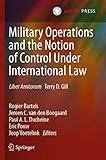Military Operations and the Notion of Control Under International Law : Liber Amicorum Terry D. Gill / edited by Rogier Bartels ... [et al.]
Material type: TextPublication details: The Hague T.M.C. Asser Press by Springer-Verlag 2021Description: xiii, 459p. : ill. ; 23cmISBN:
TextPublication details: The Hague T.M.C. Asser Press by Springer-Verlag 2021Description: xiii, 459p. : ill. ; 23cmISBN: - 9789462653979
- 23rd Ed. 341.63 BAR
| Item type | Current library | Collection | Call number | Copy number | Status | Notes | Date due | Barcode | |
|---|---|---|---|---|---|---|---|---|---|
| Reference Book | VIT AP School of Law LAW Section | Reference | 341.63 BAR (Browse shelf(Opens below)) | LA01545 | Not for loan | LAW | 020397 |
It includes Appendix Pages.
About this book:
This book is a tribute to the work of Professor Terry Gill, offered to him by friends and colleagues who are also academics and/or practitioners in the field of International Law of Military Operations (ILMO).
ILMO is a distinct sub-discipline within public international law and domestic public law, covering all domains of military operations: land, sea, air and (cyber)space. As such, ILMO includes elements of other branches of public international law, such as international humanitarian law, human rights law, the law on the use of force, the law of the sea, the law of State responsibility, arms control law and the law of international organisations. Importantly, as a hybrid field of law, ILMO covers the legal basis for military deployment both nationally and internationally, as well as the subsequent international legal regimes applicable to the forces (once deployed) and the domestic administrative and constitutional issues related to the relevant forces.
Control is a central notion of ILMO and is the leading theme of this book. The contributions in this book reflect the variety of legal frameworks applicable to military operations and offer an insightful view into the various legal and factual roles of control. The legal notion of control is considered, inter alia, in relation to restraints in the decision to deploy military forces and the legal basis for doing so. The impact of control is also discussed in relation to State and command responsibility and in different situations, including during peace operations, occupation and other situations of armed conflict. Additionally, control is considered over the armed forces themselves, over detainees migrants at sea and over the type or scale of force used in military operations, through targeting rules or rules of engagement. Furthermore, the book contains several discussions of control in the case law of international courts, within arms control law, weapons law and in the context of autonomous weapons systems.
The editors of the book are all practitioners, academically affiliated to the Faculty of Military Sciences (War Studies) of the Netherlands Defence Academy and/or the Law Faculty of the University of Amsterdam.
Table of contents (21 chapters):
Front Matter
Pages i-xiii
PDF
Introduction: Terry Gill and the Relevance of the Various Notions of Control in Military Operations Under Public International Law
Rogier Bartels, Jeroen C. van den Boogaard, Paul A. L. Ducheine, Eric Pouw, Joop Voetelink
Pages 1-14
Ensuring Military Legal Expertise Within the Netherlands Armed Forces: A Brief History of the Chair for Military Law
Gert Walgemoed
Pages 15-33
ILMO: The ‘Flux Capacitor’ of Contemporary Military Operations
Terry D. Gill
Pages 35-45
Legal Challenges in Extraterritorial Military Operations
Dieter Fleck
Pages 47-58
Decision-Making and Parliamentary Control for International Military (Cyber) Operations by the Netherlands Armed Forces
Paul A. L. Ducheine, Kraesten L. Arnold, Peter B. M. J. Pijpers
Pages 59-81
Control and the Right to Self-Defence Against Non-State Actors
Kinga Tibori-Szabó
Pages 83-105
Relevance of Control in Status of Forces Agreements
Joop Voetelink, Bas van Hoek
Pages 107-131
Effective Command and Control in United Nations Peace Operations
Ben Klappe, Jan Peter Spijk, Alfons Vanheusden
Pages 133-160
In Control: Harnessing Aerial Destructive Force
Frans P. B. Osinga, Mark P. Roorda
Pages 161-193
Some Thoughts on the Role of the Notion of ‘Control’ in ‘Choosing’ the Paradigm of Hostilities or Law Enforcement as the Governing Framework for the Use of Force in Military Operations: Is There Any?
Eric Pouw
Pages 195-217
Controlling Migrants at Sea During Armed Conflict
Martin D. Fink, Wolff Heintschel von Heinegg
Pages 219-233
The Impact of Control Over Armed Forces on Conflict Classification in War Crimes Cases
Rogier Bartels
Pages 235-261
The Requirement of Effective Control in the Law of Occupation
Marten Zwanenburg
Pages 263-280
The Shaping of the Notion of ‘Control’ in the Law on International Responsibility by Certain International and Regional Courts
Gentian Zyberi
Pages 281-305
Responsibility of Organized Armed Groups Controlling Territory: Attributing Conduct to ISIS
Katharine Fortin, Jann Kleffner
Pages 307-328
The Control Requirement of Command Responsibility: New Insights and Lingering Questions Offered by the Bemba Appeals Chamber Case
Harmen van der Wilt, Maria Nybondas
Pages 329-347
The Importance of Arms Control Law
Eric Myjer
Pages 349-368
Control in Weapons Law
William Boothby
Pages 369-392
Control Through ROE in Military Operations: Autonomous Weapons and Cyber Operations as Reasons to Change the Classic ROE Concept?
J. F. R. Boddens Hosang
Pages 393-420
‘Autonomous’ Weapons and Human Control
Jeroen C. van den Boogaard, Mark P. Roorda
Pages 421-437
State Control Over the Use of Autonomous Weapon Systems: Risk Management and State Responsibility
Robin Geiß
Pages 439-450
There are no comments on this title.

